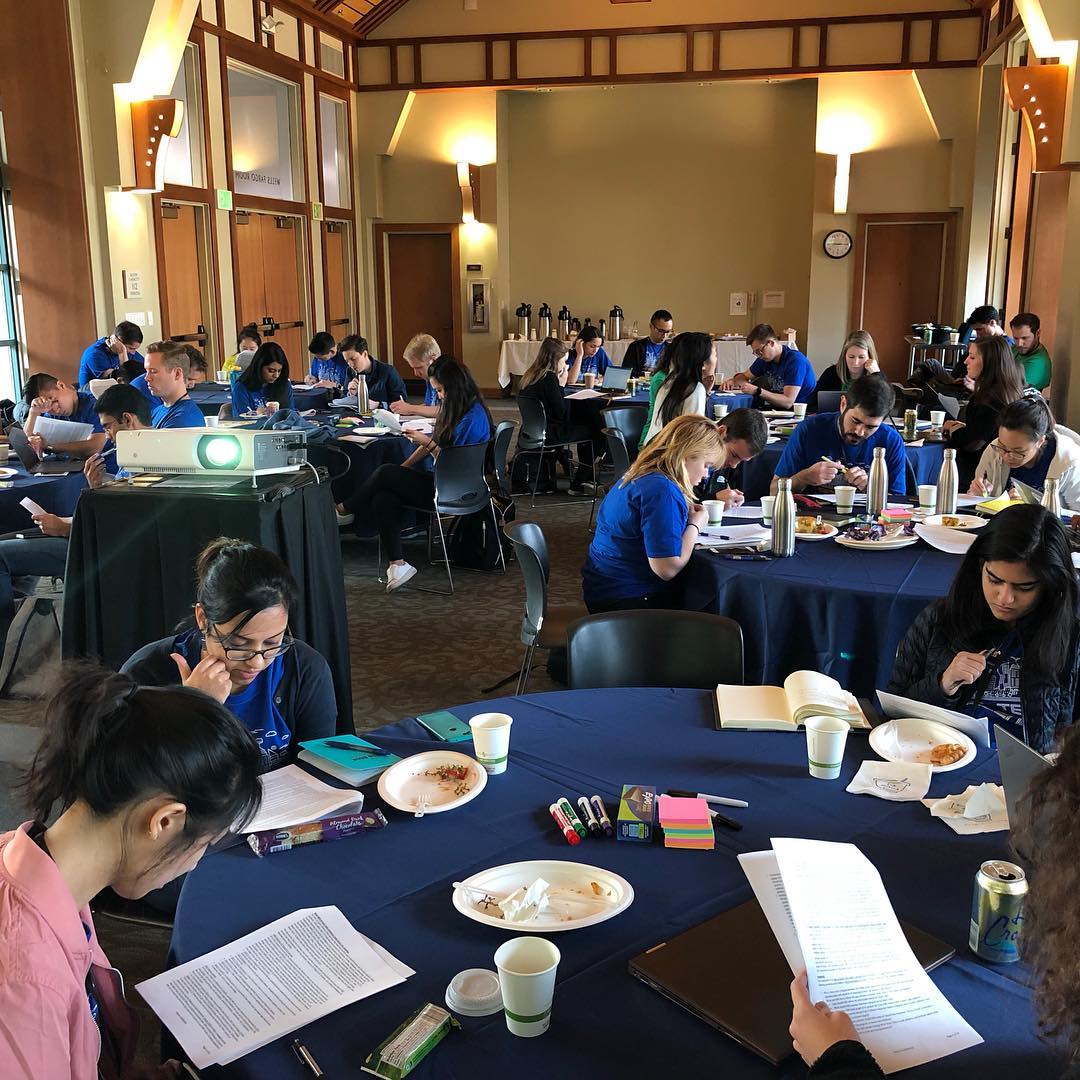UPDATE: This article was originally posted on June 1, 2018. It has been updated with new information and tips below.
Considering that when all is said and done, an elite MBA can cost as much as a house, gathering as much information as possible about potential programs is a smart move.
Though not a mandatory part of the business school application process, visiting the schools you are interested in applying to can be an important step in determining where you fit best – there is something about physically being at the school that can help you better understand its culture and opportunities.
For example, if you’re interested in learning about Thailand, you can look at countless Instagram photos, ask friends who have visited what their experience was like, and read blog posts by other travelers. However, it’s hard to say you actually understand what Thailand is really like unless you’ve been there yourself.
Business schools are no different. You can talk to friends who went to the school, attend local info sessions, and stalk the school on social media, but you still won’t really know what life is like on campus. Short of enrolling, visiting campus is the best way to ensure you invest your time and energy applying to a school that fits your needs and interests for a lifetime. It will also strengthen your ability to demonstrate your unique fit to schools in your essays.
How should you prepare for your visit?
After deciding which schools to apply to, you may have to further narrow down the list of schools you can visit, depending on your time and budget. Unless you live close to your dream school(s), you will likely not visit the campus multiple times before applying, meaning you need to make every moment count. Here are additional tips to help you do this.
Research in Advance
Before visiting, research each school thoroughly. Understand how the program works, the majors or concentrations offered, clubs and initiatives available to students, and what the school is well-known for. This will help you see how your goals and personal brand align with each school.
Deep Dives During Your Visit
Use the information gathered from your research to explore how you might spend your two years on campus. This will help you assess where you fit best.
Connect with Current Students
Schedule meetups with current students to get an insider’s view of the school. Look up clubs you’re interested in and email their leaders to arrange a coffee chat or lunch. This informal interaction can provide valuable insights into student life.
Prepare Questions
Prepare a few questions in advance to make the most of your visit. Here are a few suggestions for good questions:
Program Overview and Strengths:
- Can you provide an overview of the MBA program and its key strengths?
- What sets this MBA program apart from others in the top 10?
- Does the program have any particular strengths or specializations in certain industries or sectors?
- If you could change one thing about your MBA experience, what would it be?
Curriculum and Flexibility:
- How flexible is the curriculum? Are there opportunities to customize or specialize?
- Can you discuss any unique or innovative courses offered? What was your favorite course?
Extracurricular experience
- Are there opportunities for international exchange programs or global consulting projects?
- What were your preferred clubs? Were there artistic clubs?
- Ask about recruitment/internships
- How would you describe the community?
Your specific area (i.e entrepreneurship):
- Can you discuss the resources and support available for aspiring <entrepreneurs> or students interested in X?
Avoid personal or tricky questions unless you’re speaking with friends or close acquaintances.
Interact with Admissions Officers, if Possible
If you get the chance to meet with admissions officers, come prepared with a printed copy of your updated CV and general pitch that describes your goals and profile. While this won’t be a formal interview, it can serve as a good first impression.

However, don’t be concerned if you can’t connect with the admissions committee 1:1. They often aren’t able to do this.
Get Professional Help If Needed
If you’re unsure about your goals or haven’t defined your personal brand, consider meeting with one of our MBA consultants. They can help you build a strong application strategy and make the most of your MBA visit.
By following these steps, you can ensure that your visit to each business school is informative and beneficial, helping you make the best decision for your future.
When should you visit?

In general, you should aim to visit the schools you are interested in between January and April or between September and November. If you choose to visit over the summer, you will miss out on your chance to speak with students, attend a class, and get a feel for the school’s on-campus culture.
If you are planning to apply for Round 1 but can only visit after the deadline has passed, you should still try to visit. Some clients try to time their visits to coincide with interview invites, allowing them the chance to visit and interview on campus. Though this can be a great way to kill two birds with one stone, interviews take place on different dates for different schools, so don’t count on the fact that you’ll be able to do all your interviews on one 10-day trip.
You should plan to spend at least one full day on campus for each university you visit to ensure you get the most out of your experience. If you will travel internationally to visit multiple schools, make sure to plan travel days so you have plenty of time to get from one campus to another. Keep in mind that a flight from New York City to San Francisco is generally 6+ hours long.

Most of our clients spend an average of 10 days on a school visit trip.
What should you include in your visit?
Each school has many different types of programs available for prospective students visiting campus, however, the most common offerings include a campus tour, an information session with admissions, and a class visit. Be sure to use insights you gain from the school in your admissions essays, so take diligent notes about what students say and programs/classes/initiatives you find unique or personally interesting. This is your chance to access the business school experience beyond the school’s website, so don’t waste it!
 (Photo courtesy of @BerkeleyHaas on Instagram)
(Photo courtesy of @BerkeleyHaas on Instagram)
CAMPUS TOURS
The campus tour is a great way for you to learn about the school’s facilities and to get a sneak peek of what your life at that university would be like.
These tours are often led by current students, who can often answer many of your questions about all aspects of the MBA experience at that school (see some of our Q&As with current students at schools like Ross, CEIBS, Tuck, and CBS, among others!).
In general, do not ask your guide where they applied or for their GMAT score, as this is personal information they likely do not wish to disclose.
INFORMATION SESSIONS
Information sessions are presentations offered by members of the school’s admissions staff.
In general, they will outline key information about the program (such as average GMAT score, number of countries represented, number of students in the class) as well as information about new initiatives on campus.
Most info sessions will end with a short question-and-answer session with admissions officers. You should not use this time to promote your profile, nor to ask for personal advice (such as “I have a ## GMAT score, what are my chances of being accepted?”). Instead, ask questions that other students might find useful based on the discussions in the session, such as more details about a club or advice for international students.
CLASS VISITS

Many schools will also allow you to schedule a class visit. For many business schools, the class you attend is “luck of the draw” based on which ones align with your scheduled visit; however, if you have the choice of several classes, try to choose one that is aligned with your interests. Keep in mind that it will greatly benefit your essays if you can discuss the details of how certain classes stood out to you.
During the class, you should follow any instructions given to you by admissions and should only participate in class if the professor invites visiting students to chime in.
Otherwise, use this time to examine how the class is taught and how students interact with each other and with the professor. This can give you great insights into what it might be like to be a student at this school, so make sure you turn your phone off before joining the class.
SPECIALIZED VISIT PROGRAMS
In addition to these types of events, some business schools have specialized programs that allow you to experience “a day in the life.” MIT Sloan’s Ambassadors Program, for example, gives you the chance to have lunch with current students and meet members of the Leaders for Global Operations program. Wharton also has a similar program. Be sure to look up if your school(s) offer similar events on the admissions page!
MEETING WITH ADMISSIONS OFFICERS
Finally, some schools, like Columbia Business School, allow prospective students to drop in for individual meetings with a member of the admissions staff. If this option is available (you can either find this out on the school’s website or email a staff member of their admissions office), make sure to take advantage of the opportunity to personally connect with the people who will ultimately decide if you’re admitted or not.
If you’re able to visit with a member of the admissions committee, it’s also a good idea to bring a few thoughtful questions to ask at the end of your chat. This will not only show you’ve done your homework about the school, it’s also a great chance to learn more about the program. Good questions include things like:
- Does the school have any new initiatives or programs related to my area of interest?
- Are there any events or clubs that I should attend?
- What, in their opinion, is the most unique element of their program?
- What are some key aspects of the school’s culture?
After your talk, be sure to ask for a business card so you can send a short email thanking the admissions officer for their time in meeting with you.
During your entire visit, make sure to take diligent notes on what you experience. It’s easy to forget small details that will later play a big role in your essays and final decision.
What should you wear during your visit?

In general, most business schools encourage students to adopt business casual attire to attend classes, events, and meetings with admissions staff. For informal meetings like coffee chats, dress smart casual. Though you definitely don’t need to wear a suit and tie, we also suggest you leave your cutoffs and flip-flops at home.
Remember, first impressions matter. You want to send the message that you’re a mature, serious professional who is interested in advancing your career through an MBA.
If you’re not sure what to wear, we suggest erring on the side of slightly more dressed up rather than slightly underdressed.
TOP TIP: If you’re planning to visit schools during winter, make sure you bring adequate cold-weather clothing and footwear.
What if you can’t visit?
If you live reasonably close to the university, a visit is truly a must. If you can’t make a 1-hour drive to check out the campus, for example, it’s going to be quite difficult to convince that school’s adcom that you’re truly passionate about their program.
However, if you live far from campus or in a different country, campus visits are optional. Though they can help show your interest in the school and can be powerful tools to help you decide where you fit best, admissions committees understand that visiting campus is just not feasible for all applicants, which is why visits are not mandatory.
Worried you won’t get into your dream school?
Our expert consultants will work with you to develop a strategy tailored to your goals, ensuring every part of your application is perfect. You’ve built an impressive career and worked hard to get to this point, but now you’re facing the daunting task of pulling together a compelling MBA application. The pressure to choose which stories best sell your profile, write essays that reflect your achievements, prepare for interviews, and manage multiple deadlines can feel overwhelming. Are you doing enough to be noticed by admissions committees at top business schools?
At Ellin Lolis Consulting, we understand the stakes. With a 98.9% success rate, we’ve helped countless applicants just like you secure spots at their dream schools. application—from essays to interviews—tells a cohesive, compelling story that gets you in.
Don’t leave your future to chance. Learn more about working with us and take the first step toward a successful MBA application journey.
Real MBA Essays That Got People In
School-specific sample essays that got our clients accepted






